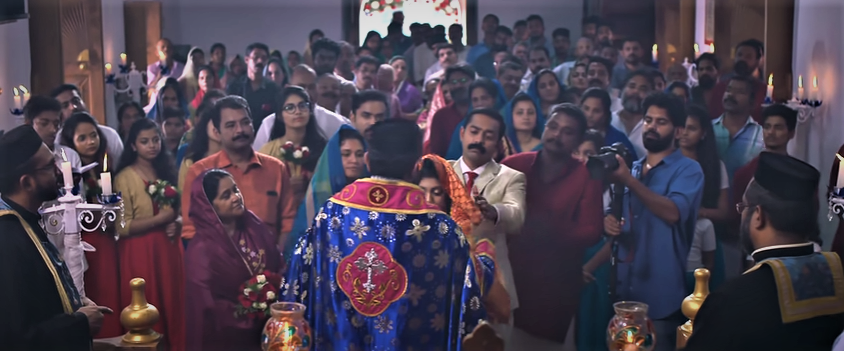Nidhin Donald explores the themes of Christian familism and individual agency, secular institutions, and reason in the 2019 film Kettiyolaanu Ente Malakha.
Nidhin Donald

Kettiyolaanu Ente Malakha (My wife is my angel), a Malayalam feature film released in 2019, has been applauded and critiqued for its treatment of marital rape. Like many other films set in Kerala’s high-altitude areas, the protagonist—Sleevachan (played by Asif Ali) is an upright Syrian Christian farmer, with eighty acres of land, a multistoried building in the nearest town and a jeep. He is socially revered for his hard-working nature and passion for agriculture. V.I. Varghese in his paper Migrant Narratives: Reading literary representations of Christian migration in Kerala tells us how the good farmer is often held synonymous to the land-owning Syrian Christian who migrated to deep forests and introduced capitalist agriculture – fighting animals and native communities. Sleevachan is a descendant and embodiment of this prototype. He is also a shy, god-fearing, Churchgoer. The tie between dominant Christian families and the local Church is well-known and has found screen-space in Malayalam Cinema. However, this nexus is rarely showcased as exploitative, rather they are visualized as respected and venerated by society in general.
The film makes it clear that Jacobite Syrian Christian institutions were a primary field of socialization for Sleevachan. The portrayal of his life around palli, parambu and penganmar (Church- land – blood sisters) is picture-perfect. The soothing aesthetics of a church-driven life, nevertheless, holds many keys to the ideological functions of religion, family and marriage. Within a secure, ‘savarna’ Christian milieu the film attempts to answer the following question- How do we deal with Sleevachan raping his wife – Rincy (played by Veena Nandakumar)?
Clearly, Sleevachan’s actions are reconciled and forgiven. While the serious issue of how the movie normalizes marital rape has already been brought under analysis, let me focus on the role of religion and religious institutions in obscuring a social problem and even saving the assaulter from constitutional law.
In the movie, religion becomes the ultimate redeemer and judge—providing solace and solutions to both the survivor and the assaulter. In this arrangement, the fundamental institution of Christian machination—the family—is protected and unhindered from the interventions of the state (through courts, hospitals or police stations). In other words, the sovereignty of the family, an essential leg of Christian familism (or religious familism in general) is protected from dissolution.
How is this done?
To begin with, the Church and its priest form the most accessible and legitimate source of information, counsel and deliberation for the protagonist. The parish priest, who is also a relative, uses his power to dismiss Sleevachan’s non-communication with women who aren’t blood-relatives. In fact, this infirmity is considered a rare quality. The Church operates as a network to arrange Sleevachan’s wedding with Rincy. In the aftermath of the marital rape—portrayed as an unfortunate family tragedy—Sleevachan’s mother and sisters step up to protect the standing and honour of this propertied family with the help of the local parish. The parish priest also provides counselling services, post the incident, and ensures that nothing much is known to the larger family or the in-laws. Sleevachan, as an obedient Christian-subject, is dependent on the Church for life-direction, explanations and judgements. In fact, his friends – outside this sacred realm – become a source of misinformation, – leading him to the ‘unfortunate’ incident in the first place. The influence of the parish priest and the Church is revealed undisputedly when an unconscious Rincy is brought to a government hospital. In the entire film, the government hospital becomes the darkest place—; confronting a lovable, shy Sleevachan with the dire consequences of his action. The government doctor is the only individual in the movie who confronts Sleevachan as an anonymous assaulter. However, this interesting turn of events is reversed immediately with the entry of the parish priest who convinces the Christian doctor to not report Sleevachan. Thus, it is outside the church-driven milieu that Sleevachan is confronted with imminent danger and truth; only to be upturned instantly.
The authority of the Church is no less evident in the life of the rape survivor, Rincy. As mentioned earlier, Rincy,- an individual brought up in Bangalore (nothing much is known about her except for her talent in art), was married to Sleevachan through church networks. In the aftermath of the incident, Rincy comes to a logical conclusion of annulling her relationship with her assaulter husband. However, under the pressure of her ‘well-meaning’ mother-in-law, she stays back to heal her wounds. In the meanwhile, the charismatic meetings in the local church, organized and publicized by Sleevachan, come to her soothing rescue.
In due course, wounds are healed, Sleevachan is forgiven and even emerges as a benevolent land-owner who saves an interfaith alliance. Additionally, but not surprisingly, the good farmer is rewarded by the nation-state for his innovation and Rincy accompanies him as a dutiful wife for the award function—: – a textbook moment for Christian familism.
The writer and director of the movie appreciate the Church for being a parallel infrastructure that ultimately resolves unmindful blunders and fortifies the sanctity of marriage and family. Religion (as opposed to secular, public institutions) is portrayed as a locus of safety, comfort and resolutions in a scenic location. Such a portrayal is distressing and it raises several questions: Can religion be absolved of all responsibility in the context of marital rape? Hasn’t religious obscurantism and gender ideology played a crucial role in producing and reproducing Sleevachan? Is the dominance of Christian infrastructure a sign of cynicism that belittles rational actions against social problems?
Obviously, the movie doesn’t ask these questions. What we have in the offer is a triumphant Christian familism and an absent or compromised Constitutional State.
About the Author: Nidhin Donald is a doctoral student at Jawaharlal Nehru University. His work focuses on the sociology of religion and family. He can be contacted at shobhana.nidhin@gmail.com

One comment